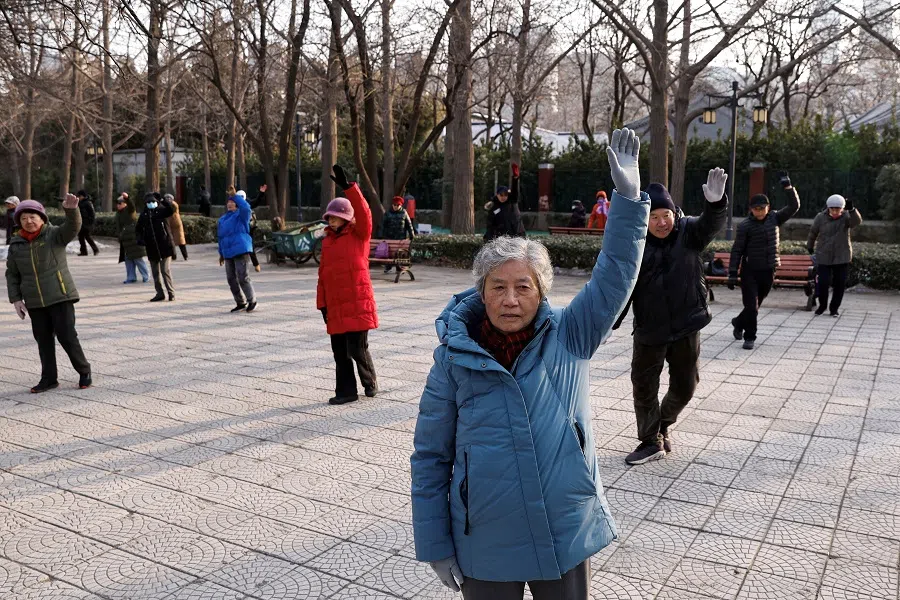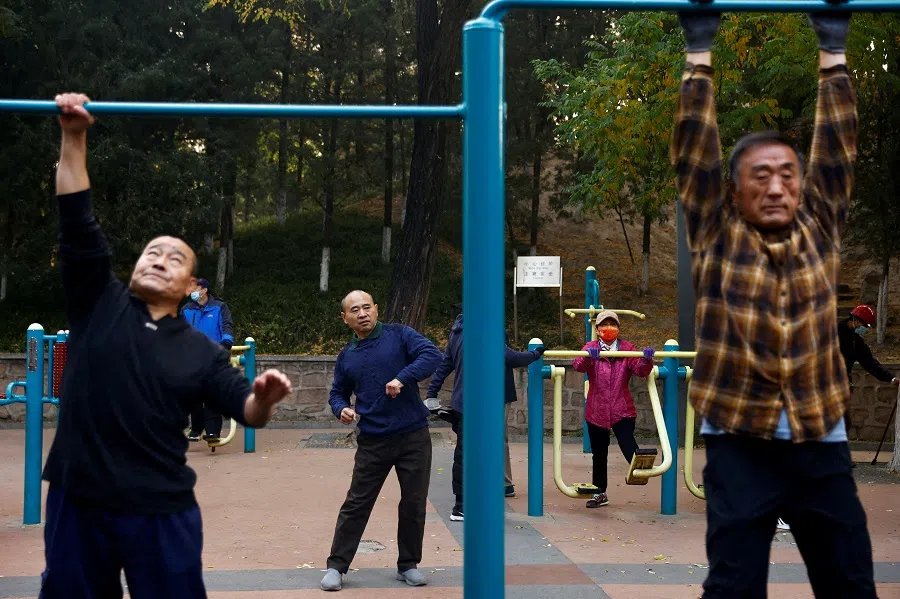China’s delayed retirement plan might not work in some provinces
Chinese academic Zhang Tiankan assesses that the implementation of delayed retirement in China must be done in tandem with the improvement of people’s health and the promotion of healthy lifestyles. Only then can people obtain a longer life expectancy and enjoy a longer healthy life expectancy.

Several Chinese provinces, including Guangdong, Yunnan and Heilongjiang, have recently held meetings to discuss gradually raising the statutory retirement age. These meetings emphasised the importance of building public consensus and ensuring the policy’s smooth and effective implementation.
China’s retirement age will gradually increase starting 1 January 2025, over 15 years. The plan raises the retirement age from 60 to 63 years old for male workers, 50 to 55 years old for female blue-collar workers and 55 to 58 years old for female white-collar workers.
Life expectancy versus healthy life expectancy
Despite the many perspectives and opinions which are not just a matter of differing views, the government’s actions indicate that the policy will move forward regardless of public reception.
While there are many reasons for delaying retirement, policy decisions should be grounded in citizens’ healthy life expectancy rather than just overall life expectancy. Moreover, it should provide people with a choice and be something they willingly accept.
... healthy life expectancy represents the average number of years an individual is expected to live in full health, excluding periods of poor health due to illness or injury.

Globally, delaying retirement has become a mainstream trend. According to statistics from the Organisation for Economic Co-operation and Development (OECD), Iceland, Israel and Norway have the highest statutory retirement age, at 67 years. However, their actual retirement ages are slightly lower than their statutory ages. Of course, there are countries where people retire earlier. Saudi Arabia has the earliest statutory retirement age of 47 years, with full pension benefits.
The late retirement ages of Iceland, Israel and Norway are based on their citizens’ high average life expectancy and healthy life expectancy. Average life expectancy refers to the average number of years a person is expected to live, assuming current age-specific mortality rates remain constant. Meanwhile, healthy life expectancy represents the average number of years an individual is expected to live in full health, excluding periods of poor health due to illness or injury.
While life expectancy is generally longer than healthy life expectancy, the latter determines whether individuals can continue working and contribute to society in their later years.
Different standards to healthy life expectancy
When it comes to life expectancy and healthy life expectancy, pre-pandemic data are more reliable. The World Population Prospects 2019 report by the United Nations (UN) projects the average life expectancy at birth for two time periods (2015-2020 and 2045-2050) for males, females and total population globally. We can assess the life expectancy in China and other countries and regions from the 2015-2020 data.
If we consider the number of years one can live healthily and work after the age of 60, Israelis have an average of 12.4 years, Icelanders have 12 years, while the Chinese have 8.5 years.

Based on the average life expectancy at birth for individuals born between 2015 and 2020, regardless of gender, the top ten countries/regions are Hong Kong, Japan, Macau, Switzerland, Singapore, Spain, Italy, Australia, Iceland and South Korea, with an average life expectancy ranging from 82 to 85 years. During this period, the global average life expectancy stood at 72.3 years, while China’s was 76.6 years.
The World Health Organization’s World Health Statistics 2022 report provides data on the average life expectancy and healthy life expectancy for individuals worldwide in 2019. The top ten countries in terms of healthy life expectancy are Japan (74.1 years); Singapore (73.6 years); South Korea (73.1 years); Switzerland (72.5 years); Cyprus and Israel (72.4 years); France and Spain (72.1 years); Iceland (72.0 years); and Italy and Sweden (71.9 years), with healthy life expectancies ranging between 71 and 75 years. That year, the global average healthy life expectancy was 63.7 years, while China’s was 68.5 years, ranking 44th in the world.
If we consider the number of years one can live healthily and work after the age of 60, Israelis have an average of 12.4 years, Icelanders have 12 years, while the Chinese have 8.5 years. Thus, even if Israelis and Icelanders retire at 67, they can still continue to work.
Indeed, China’s retirement age hike for both men and women falls within the average healthy life expectancy during which individuals can continue working. However, measuring healthy life expectancy is not very clear-cut.
... a one-size-fits-all approach to delayed retirement may not be suitable for some groups of people.

Firstly, there may be differences in standards. Secondly, China is a vast region, with rural and urban differences as well as huge geographic differences. Hence, a one-size-fits-all approach to delayed retirement may not be suitable for some groups of people.
For example, healthy life expectancy standards can vary significantly. In China, many individuals face chronic diseases, but the severity of these conditions differs widely. This variability makes it difficult to use the presence of chronic diseases as a consistent measure of healthy life expectancy, particularly when symptoms are mild. Such uncertainty can impact an individual’s ability to work.
Meanwhile, according to statistics from China’s National Health Commission, the country’s average life expectancy was 77.3 years in 2019 and healthy life expectancy was 68.5 years. However, life expectancy varies across different Chinese regions. The top three in 2019 were Shanghai (83.66 years), Beijing (82.31 years) and Tianjin (81.69 years); while the bottom three were Gansu (73.92 years), Qinghai (73.12 years) and Tibet (70.6 years). Unfortunately, data on healthy life expectancy is unavailable in many regions.
Based on China’s national average healthy life expectancy of 68.5 years, the healthy life expectancy in underdeveloped provinces and regions may only be 65 years or lower...
Increasing healthy life expectancy
Based on China’s national average healthy life expectancy of 68.5 years, the healthy life expectancy in underdeveloped provinces and regions may only be 65 years or lower, which makes it difficult for people in these regions to delay retirement due to the lack of energy and time.
Thus, this shows that the implementation of delayed retirement in China must be done in tandem with the improvement of people’s health and the promotion of healthy lifestyles. Only then can people achieve a longer life expectancy and enjoy a longer healthy life expectancy.
If public health and medical care can be upgraded, and personal lifestyles can be improved, people in many parts of the world — not just China — will see a corresponding increase in healthy life expectancy alongside longer lifespans.

The UN’s “World Population Prospects 2024” projected that the global average life expectancy will reach 77.4 years by 2054. It also estimated that by the late 2050s, over 50% of all deaths globally will occur at age 80 or higher.
However, due to a variety of factors — malnutrition, lack of healthy lifestyle choices, insufficient exercise, smoking and excessive drinking, long working hours and shorter rest periods — the healthy life expectancy of many people is in fact decreasing.
If public health and medical care can be upgraded, and personal lifestyles can be improved, people in many parts of the world — not just China — will see a corresponding increase in healthy life expectancy alongside longer lifespans. By then, more people will also voluntarily choose to delay retirement.
Throughout the history of human evolution, most people are willing to live and labour until they die. As a line in a Chinese poem goes, “A silkworm keeps spinning silk until the end of its life.”
This article was first published in Lianhe Zaobao as “延迟退休的基础是良好健康预期寿命”.





